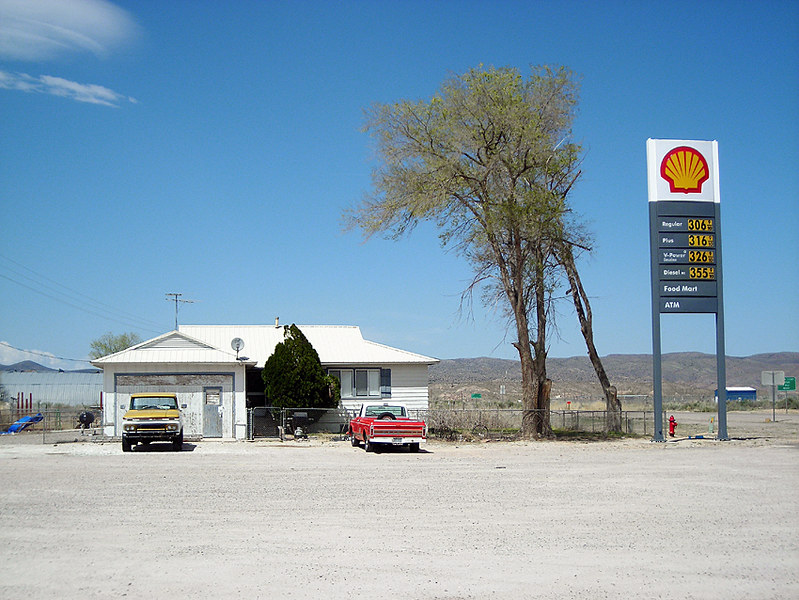Think of Nevada and the cacophony of Las Vegas springs to mind as a reflex.[1] It’s a familiar refrain that repeats across hundreds of desert towns large and small. Envision a symbiotic intertwining of a state economy and a robust gaming industry. Entire towns have even blossomed simply to entice the residents of stricter states seeking legalized gambling.
There are at least two towns in Nevada that bucked that trend. Both banned industrialized casino-style games of chance from their inception[2]. The long arm of the Federal government contributed to both cases. However, interestingly enough, in opposite ways; one town in spite of the government and one because of it.
Panaca

A river called the Meadow Valley Wash drains a portion of southern Nevada as part of the much larger Colorado River watershed. True to its name, the river nurtures greenery along its banks as it traverses the arid desert terrain. Early settlers took notice. Mormons eyed the Meadow Valley as a logical extension of their geographical reach as they sought to expand from their base in Salt Lake City. They colonized Panaca, Utah with several hundred settlers in 1864 (map).
UTAH?
Yes, Utah. Nevada split from Utah in 1861 and became a state in 1864. It gained successive slices of Utah’s territory including a final degree of longitude in 1866. The reasons were varied. Ostensibly, this was a mining district and Nevada was a mining state. Nevada could better manage these resources as the story goes.
However, one shouldn’t discount good old-fashioned discrimination and distrust of the Mormon people either. Nevada gained statehood after only three years. Utah remained locked in second-class status as a territory for nearly fifty years. It also lost major chunks of land to its neighbors on several sides.
Residual Utah in Spirit
The citizens of Panaca became unexpected residents of Lincoln County, Nevada only two years into the colonization. Many people returned to the Utah Territory now several miles away. Others ignored Nevada’s sovereignty and refused to pay taxes for a number of years. Those who remained acquiesced eventually but they didn’t abandon their values or their faith. The residents of Panaca turned inward to preserve their way of life.
They farmed the Meadow Valley and formed an uneasy relationship with unruly silver miners streaming into eastern Nevada. Miners needed provisions and Panaca could supply them for a price. Eventually the bulk of prospectors moved away in search of the next big strike. They left nothing but a string of abandoned ghost towns crumbling into the desert floor.
Panaca easily outlasted the short-timers who arrived in the valley with silvery dreams of riches. Several hundred people still reside in Panaca, many of them descended from original settlers. Thus, its remoteness insulating the town from contradicting social influences. The Federal government changed the border, but did Panaca really ever leave Utah philosophically? It’s no wonder that the town bans both gambling and alcohol within its borders.
Boulder City

Boulder City is a much more recent creation (map). The town owes its existence to the Bureau of Reclamation, an agency of the U.S. Department of the Interior. The government erected Boulder City in 1932 as a place to house thousands of workers building nearby Hoover Dam. It ran the town as a government camp for the next quarter century, making all decisions normally reserved for a town’s citizens. The government determined that gambling and alcohol were detrimental to its workforce. Thus, residents got no choice other than moving away.
The Bureau of Reclamation eventually relinquished control. Later Boulder City incorporated in 1960. It jettisoned alcohol prohibition but continued to outlaw gambling for its sixteen thousand residents. Chapter 4-4-1 of the Boulder City Code states explicitly that “it shall be unlawful for any person to allow, operate, carry on, conduct or maintain gambling within the City“. Even so, it does provide exceptions for certain charity events and for social games in private residences.
This custom is a rather quaint artifact and an unusual anomaly given its geography. Clearly it can’t have much of an impact on the habits of residents who can be standing on the Las Vegas Strip in less than half an hour, or at smaller establishments just over the Boulder City line. Perhaps that’s the point. They’ve created a quiet oasis for daily living with plenty of options just beyond town.
12MC Loves Footnotes!
[1] Yes, I succumbed to those bright lights a couple of years ago and gambled my customary one dollar on a trip to Vegas to attend a wedding. I neither demonize nor advocate gambling – let adults make their own financial decisions – I’m simply cheap. Notoriously cheap.
[2] I say “at least two locations” have banned gambling although wherever I looked on the Intertubes it said “only two locations”. The readers of Twelve Mile Circle have debunked similar claims several times before. So please submit a comment if you know of any other locations in Nevada.

Leave a Reply